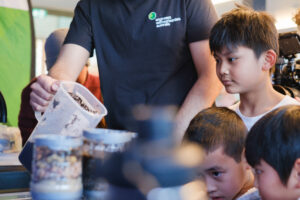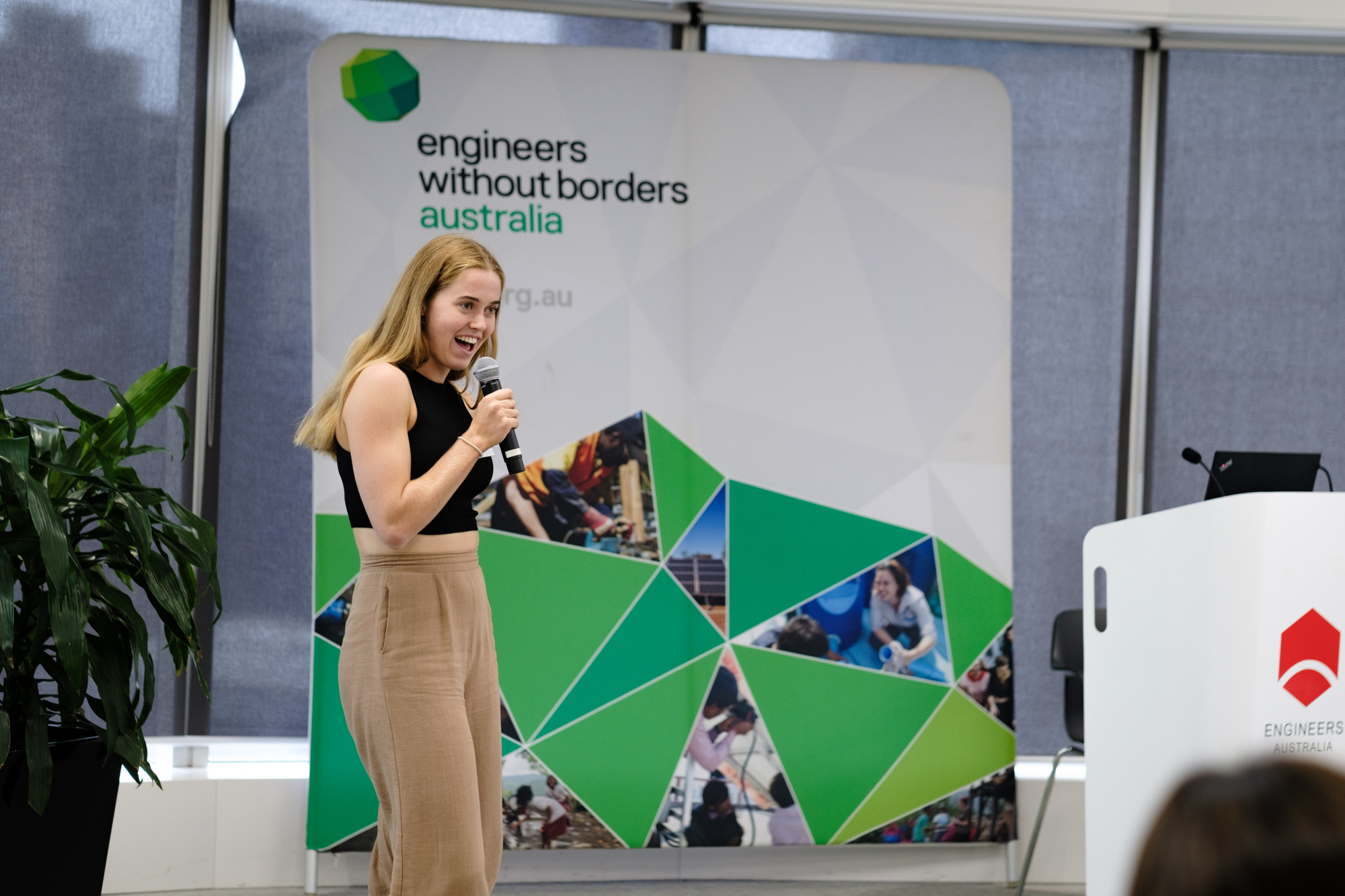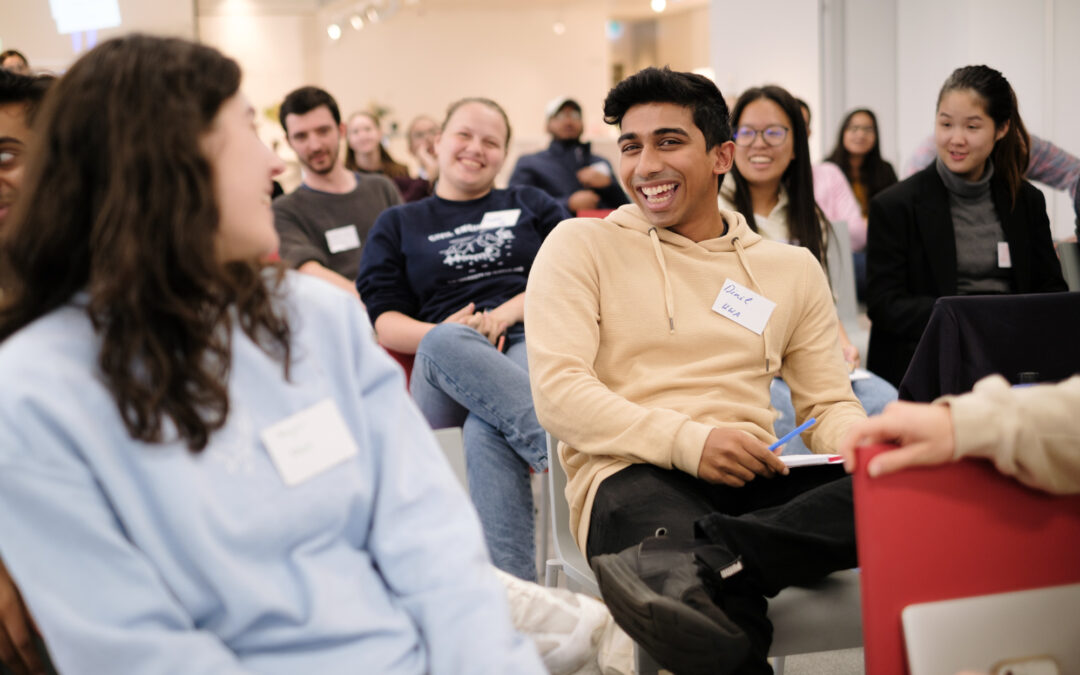Caption: Youth Outreach volunteers convene at the Futur-neers Forum in Melbourne (April 2022).
A year of targeted investment in EWB’s volunteer-driven Youth Outreach program placed a strong focus on impact evaluation and shaping the “next era” of outreach at EWB.
The Futur-neers project focused on amplifying EWB’s engineering workshops for young people and the passionate volunteer community connected with this work. The project aims were twofold: to positively impact female school students participating in the workshops, as well as the female volunteers coordinating and delivering the program. Data from this project evidences those aims – that EWB Outreach is meaningfully engaging school students with engineering as a possible career path, as well as generating inspiration in the volunteers who deliver the workshops and motivating them to continue in the sector themselves.
While the engineering sector continues to struggle with gender diversity, the Futur-neers project has reaffirmed the importance of EWB’s Youth Outreach program and created a strong foundation on which to grow outreach at EWB.
EWB Outreach: showcasing a powerful story

Students participating in a Youth Outreach session run by the Monash University Chapter in 2022.
EWB’s Youth Outreach workshop modules showcase the potential of creative and conscious engineering practice – engaging young people with the power of engineering to create positive impact and the possibilities contained in STEM careers. Workshops are designed so participants have fun (always important!), while being facilitated through leading practice enquiry-based learning delivered by a diverse EWB volunteer team.
Over the year-long Futur-neers project, EWB Youth Outreach volunteers delivered approximately 260 workshops across the country, reaching at least 6,100 young people. Volunteer teams experienced differing levels of COVID-19 lockdowns during this time and put fantastic efforts into implementing COVIDSafe plans, delivering sessions online and keeping their facilitator teams “ready to deploy” during a challenging time.
Survey data analysis shows this was worth the effort. Pre- and post-workshop survey responses showed a statistically significant increase in both “awareness of engineering as a career” and “interest in engineering as a potential career path” among the school students involved. Qualitative feedback from teachers also supported the finding that student participants were more aware of and interested in engineering after being involved in the workshop sessions:
One teacher said, “Thank you so much for today’s program. The girls certainly did walk away having gained a great insight into the work of engineers. I heard a few state that they were glad they came as they had fun but also would be interested in finding out more about engineering as a possible pathway for them – they hadn’t even considered it earlier.”
Part of this positive impact can be attributed to the content and delivery mode, but another key ingredient is the workshop facilitators themselves – passionate engineering students and professionals who represent a wide variety of examples of “who can succeed as an engineer”. We’ve recognised this and are aiming to give these inspiring engineering students and professionals a larger platform, starting with our Futur-neers Role Models video series which has generated active engagement across our public channels.
Motivating and retaining women in engineering

Youth Outreach volunteer, Aimee Ryan, speaking at the Futur-neers Forum in Melbourne (April 2022).
We know the engineering sector is challenged both by the low numbers of young women choosing to study engineering, and by the need to support them to stay in the discipline and find satisfaction in an engineering career once they graduate.
Previous EWB research identified that promoting engineering as a profession with positive impact was likely to increase gender diversity. More specifically, by speaking to this message and acting as a role model for others, EWB volunteers were motivating their audiences but also becoming more motivated themselves. Our Futur-neers findings provide more evidence for this hypothesis, with all female respondents to the Facilitator Survey who were studying engineering reporting that their Youth Outreach experience had motivated them to continue with their degree. Our analysis to date suggests that the activity of talking about engineering as “a profession with impact” and stepping into a role model position is beneficial for all activity participants, including the audience and the presenters themselves.
One of the participants commented: “EWB has motivated me to studying harder as an engineer. Each time I take part in the program I become excited as it makes me proud to be an engineer.”
Other activities within the Futur-neers project aimed to support the retention of women in engineering through facilitating community and connection. In this area we saw more mixed results. April 2022 saw the delivery of our inaugural Futur-neers Forum, a 2.5-day EWB volunteer event with 45 participants from across the country. This was the first national in-person gathering for EWB since 2019 and was a welcome return to connecting, learning and socialising with values-aligned peers. All participants reported feeling more connected to the EWB community post-event. However, while the Futur-neers Forum had strongly positive feedback, it is clear from our end-of-project surveys that there is more work to be done to build a sense of connection between volunteers and chapters beyond these events. EWB Youth Outreach volunteers who were unable to attend the Futur-neers Forum reported much lower levels of connection to EWB and the volunteer network, and many expressed a desire for more of these opportunities.
The future of Futur-neers
This Futur-neers investment came at a critical moment for EWB, while our programs and volunteer network across the country were responding to the shocks of a global pandemic. Staff and volunteers faced new requirements for COVID-related risk management as well as continually preparing for contingencies related to travel, health and isolation requirements. Also in the context of unprecedented levels of volunteer burnout documented across all sectors, EWB Youth Outreach volunteers were able to transition to new systems, train new workshop facilitators and reactivate in-person workshops in numerous schools. Importantly, challenges identified by volunteers during this process were also captured in the project evaluation and have informed a set of recommendations that will be utilised in EWB Youth Outreach and Volunteer Mobilisation program planning going forward.

Students participating in a Youth Outreach session run by the Monash University Chapter in 2022.
Engineers Australia’s June 2022 Women in Engineering research report identified that “to drive girls to consider pursuing engineering as their area of further study and career, we need to increase their familiarity with it as a career option and profession more broadly”. And more specifically, there is still an urgent need to prioritise building the perception of engineering as “an inherently impactful and fulfilling career” by focusing on the message of how engineers “shape a better tomorrow”.
Clearly, EWB still has a key role to play in promoting engineering to young people as a profession with positive social and environmental impact. As the Futur-neers project concludes, EWB is even more strongly positioned with the evidence base, learning content, systems and volunteer teams to respond.
The Futur-neers project was made possible through the Australian Government Department of Industry, Science, Energy and Resources through the Women in STEM and Entrepreneurship grant program and delivered alongside other collaborators, EWB staff and volunteers.


